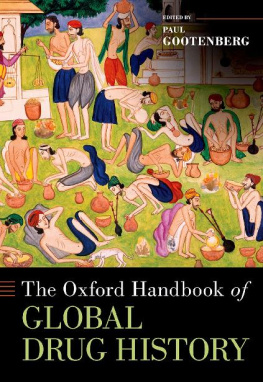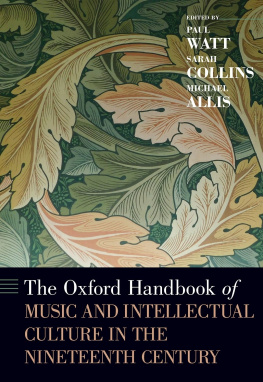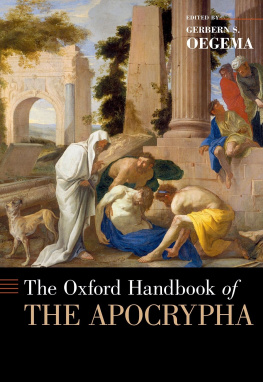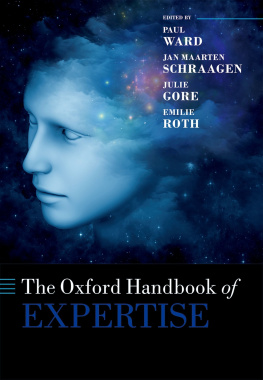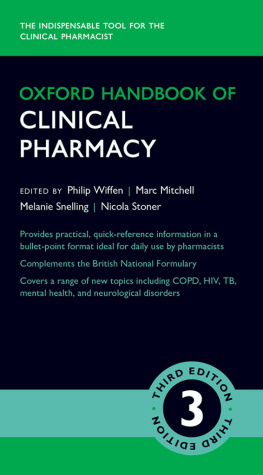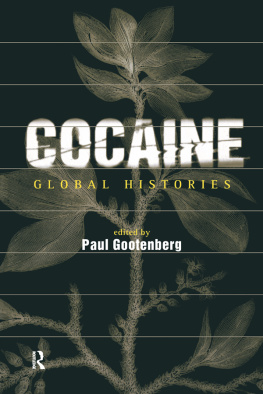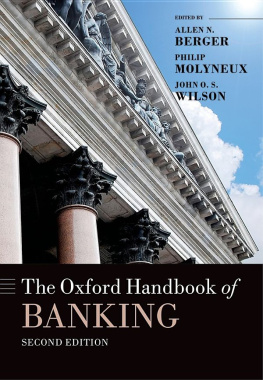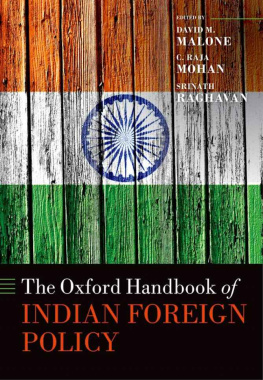The Oxford Handbook of
Global Drug History
The Oxford Handbook of
Global Drug History
Edited by
PAUL GOOTENBERG
Oxford University Press is a department of the University of Oxford. It furthers the Universitys objective of excellence in research, scholarship, and education by publishing worldwide. Oxford is a registered trade mark of Oxford University Press in the UK and certain other countries.
Published in the United States of America by Oxford University Press
198 Madison Avenue, New York, NY 10016, United States of America.
Oxford University Press 2022
All rights reserved. No part of this publication may be reproduced, stored in a retrieval system, or transmitted, in any form or by any means, without the prior permission in writing of Oxford University Press, or as expressly permitted by law, by license, or under terms agreed with the appropriate reproduction rights organization. Inquiries concerning reproduction outside the scope of the above should be sent to the Rights Department, Oxford University Press, at the address above.
You must not circulate this work in any other form and you must impose this same condition on any acquirer.
Library of Congress Control Number: 2021039944
ISBN 9780190842642
eISBN 9780197549742
DOI: 10.1093/oxfordhb/9780190842642.001.0001
Table of Contents
Paul Gootenberg, Stony Brook University
Neil Carrier
Elisa Guerra-Doce
Henrique S. Carneiro
Stacey Schwartzkopf
Davide Torri
Benjamin Breen
Marcy Norton
Martin Nesvig
James McHugh
Charles Ambler
Timothy A. Hickman
Haggai Ram
James H. Mills
Yangwen Zheng
Sara Black
David Bewley-Taylor
David Herzberg
Christopher Hallam
Isaac Campos
Pavel Vasilyev
Robert P. Stephens
Miriam Kingsberg Kadia
Mathew R. Pembleton
Nancy D. Campbell
Samuel K. Roberts
Alexandre Marchant
Enrique Desmond Arias
Ryan Gingeras
Maziyar Ghiabi
Kathryn Meyer
Pierre-Arnaud Chouvy
Gernot Klantschnig
James T. Bradford
Kasia Malinowska and Summer Walker
Virginia Berridge
Several years ago, an Oxford University Press editor sat me down at my office at a hip downtown bookstore-caf. She was trying to sell me on the idea of editing an OUP Handbook on my long academic passionthe global history of drugsa topic I began diving into as a Latin American historian starting in the mid-1990s. Despite her frank talk about the pros and cons, and ups and downs, of taking on these large projects, I really had no clue what I was getting into. Since that day, putting together this Handbook has proven to be a fascinating personal learning experience about the state of this exciting and rapidly evolving field of global drug history, one that has broadened my intellectual identity as a historian of drugs. But its also felt, Ill confess, like an arduous and at times even interminable toil of reconciling widely diverse authorial styles, and of reigning in thousands of bits of historical minutia. Thirty-five chapters, on topics from all parts of the world, are admittedly a lot for one person to handle. The Handbook of Global Drug History aspires to be a truly global overview of the latest scholarship, one that brings together not just centuries of drugsstarting from the iconic shamans of prehistory all the way through to todays notorious global traffickersbut that also brings together accumulating historical evidence from five continents of drugs (with apologies only to Australia/Oceania). Honestly, I probably wouldnt have the energy to do it again.
I especially want to thank all of my wonderful colleagues in the Alcohol and Drugs History Society (ADHS), without whom this volume would have been both unthinkable and undoable. Past ADHS presidents Virginia Berridge and Timothy Hickman (both of them authors in this volume) were crucial over the last decade in transforming the ADHS into a uniquely innovative and globalized hub for doing drug history. Their biennial international meetings were strategic to this cause. In spring of 2017, for example, I exploited the Utrecht ADHS conference to check out and recruit the top prospective authors in the field; and in spring of 2019, with most of the chapter drafts in, I exploited the subsequent ADHS meeting in Shanghai to host a roundtable of Handbook contributors to share their findings, intersections, and understandings of drug historical trends. Among those participants were authors Nancy D. Campbell, Isaac Campos, Henrique S. Carneiro, Maziyar Ghiabi, David Herzberg, Miriam Kingsberg Kadia, James McHugh, Haggai Ram, and Robert P. Stephens. I eagerly await the next ADHS conference, when contributors can mark the publicationperhaps with a pricey tequilaof this volume, which represents the breakthroughs of this larger community of drug history scholars.
I want to mention the remarkable help, in the final year of editing, of Spencer M. Austin, a doctoral student in history at Stony Brook University who served as the projects graduate assistant. Spence is not even a historian of drugs per se, but he approached the ultimate tasks of pulling this oversized edited manuscript together with astonishing skill, superb attention to detail, and, well, unbelievable energy and patience. I could not have completed this book without himso, thank you, Spence! I must also thank Nancy Toff, executive editor at OUP, who corrected the many earlier errors of our ways and guided us through the final hoops, as well as OUP project manager Prakash Jayaraman for the books speedy and nearly painless copy-editing and production.
Paul Gootenberg
Charles Ambler is Professor of History at the University of Texas at El Paso and is co-editor of Drugs in Africa (2014). In 2010 he was President of the African Studies Association and in 201920 he was Dean in Residence at the Council of Graduate Schools in Washington, DC.
Enrique Desmond Arias is Marxe Chair of Western Hemisphere Affairs and Professor at Baruch College and the Graduate Center, City University of New York. He is the author of Criminal Enterprises and Governance in Latin America and the Caribbean (2017) and Drugs and Democracy in Rio de Janeiro: Trafficking, Social Networks, and Public Safety (2006).
Virginia Berridge is Professor of History at the London School of Hygiene and Tropical Medicine, University of London. She is the author of many books and articles about drugs, alcohol, tobacco policy, and the relation between evidence and policy, including Demons: Our Changing Attitudes to Alcohol, Tobacco and Drugs (2013). Berridge was President of the Alcohol and Drug History Society (ADHS) from 201517.
David Bewley-Taylor is Professor of International Relations and Public Policy and founding Director of the Global Drug Policy Observatory at Swansea University. He is the author of The United States and International Drug Control, 19091997 (1999); International Drug Control: Consensus Fractured (2012); and editor, with Khalid Tinasti, of the Research Handbook of International Drug Policy (2020).
Sara Black is Assistant Professor of History at Christopher Newport University. Her first book is Drugging France: Mind-Altering Medicine in the Long Nineteenth Century (2022).
James T. Bradford is Associate Professor of History at Berklee College of Music and Adjunct Lecturer at Babson College. He is the author of Poppies, Politics, and Power: Afghanistan and the Global History of Drugs and Diplomacy (2019), and he has published in Iranian Studies and Illegal Cannabis Cultivation in the World .



